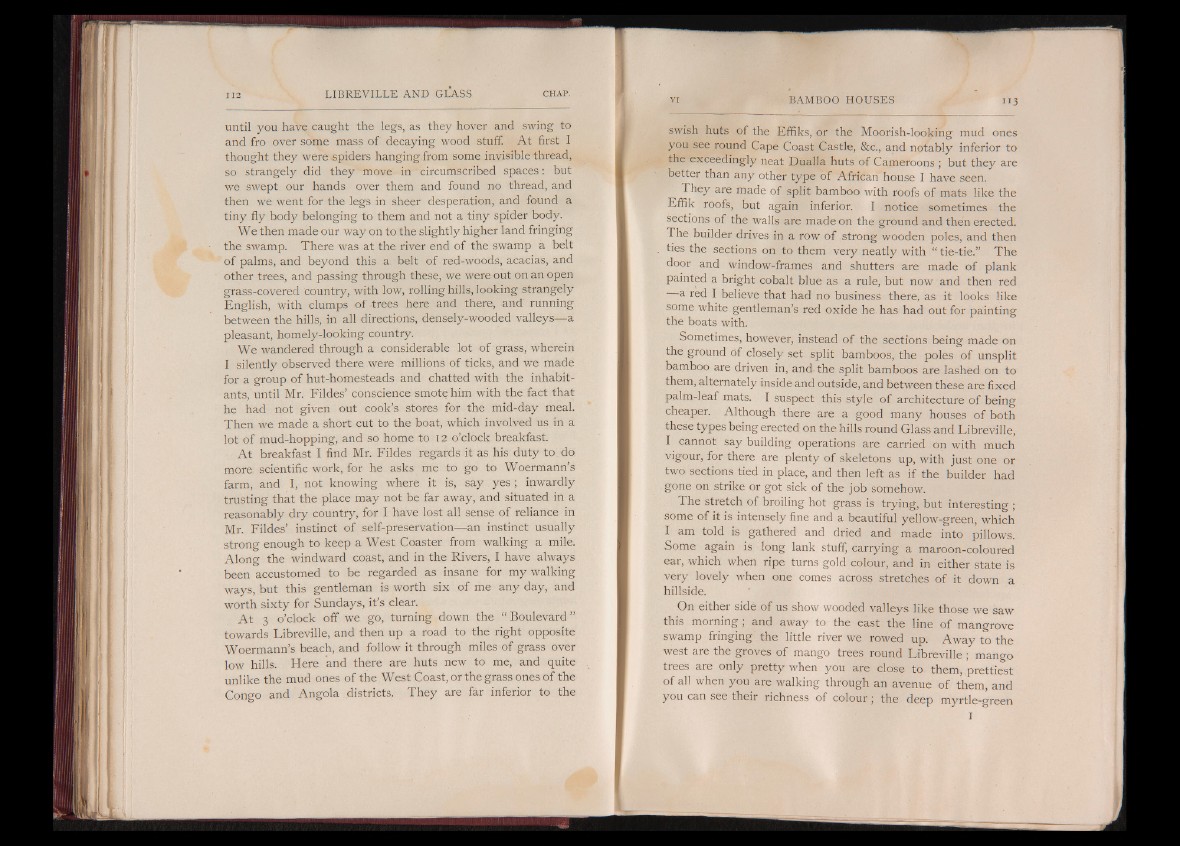
until you have caught the legs, as they hover and swing to
and fro over some mass of decaying wood stuff. A t first I
thought they were spiders hanging from some invisible thread,
so strangely did they move in circumscribed spaces: but
we swept our hands over them and found no thread, and
then we went for the legs in sheer desperation, and found a
tiny fly body belonging to them and not a tiny spider body.
We then made our way on to the slightly higher land fringing
the swamp. There was at the river end of the swamp a belt
of palms, and beyond this a belt of red-woods, acacias, and
other trees, and passing through these, we were out on an open
grass-covered country, with low, rolling hills, looking strangely
English, with clumps of trees here and there, and' running
between the hills, in all directions, densely-wooded valleys— a
pleasant, homely-looking country.
We wandered through a considerable lot of grass, wherein
I silently observed there were millions of ticks, and we made
for a group of hut-homesteads and chatted with the inhabitants,
until Mr. Fildes’ conscience smote him with the fact that
he had not given out cook’s stores for the mid-day meal.
Then we made a short cut to the boat, which involved us in a
lot of mud-hopping, and so home to 12 o’clock breakfast.
A t breakfast I find Mr. Fildes regards it as his duty to Mo
more scientific work, for he asks me to go to Woermann’s
farm, and % not knowing where it is, say yes ; inwardly
trusting that the place may not be far away, and situated in a
reasonably dry country, for I have lost all sense of reliance in
Mr. Fildes’ instinct of self-preservation— an instinct usually
strong enough to keep a West Coaster from walking a mile.
Along the windward coast, and in the Rivers, I have always
been accustomed to be regarded as insane for my walking
ways, but this gentleman is worth six of me any day, and
worth sixty for Sundays, it’s clear.
A t 3 o’clock off we go, turning down the “ Boulevard”
towards Libreville, and then up a road to the right opposite
Woermann’s beach, and follow it through miles of grass over
low hills. Here and there are huts new to me, and quite
unlike the mud ones of the West Coast, or the grass ones of the
Congo and Angola districts. They are far inferior to the
swish huts pf the Efifiks, or the Moorish-looking mud ones
you see round Cape Coast Castle, &c., and notably inferior to
the exceedingly neat Dual! a huts of Cameroons ; but they are
better than any other type of African house I have seen.
They are made of split bamboo with roofs of mats like the
Effik roofs, but again inferior. I notice sometimes the
sections of the walls are made on the ground and then erected.
The builder drives in a row of strong wooden poles, and then
ties the sections on to them very neatly with “ tie-tie.” The
door and window-frames and shutters are made of plank
painted a bright cobalt blue as a rule, but now and then red
a red I believe that had no business there, as it looks like
some white gentleman’s red oxide he has had out for painting
the boats with.
Sometimes, however, instead of the sections being made on
the ground of closely set split bamboos, the poles of unsplit
bamboo are driven in, and-the split bamboos are lashed on to
them, alternately inside and outside, and between these are fixed
palm-leaf mats. I suspect this style of architecture of being
cheaper. Although there are a good many houses of both
these types being erected on the hills round Glass and Libreville,
I cannot say building operations are carried on with much
vigour, for there are plenty of skeletons up, with just one or
two sections tied in place, and then left as if the builder had
gone on strike or got sick of the job somehow.
The stretch of broiling hot grass is trying, but interesting ;
some of it is intensely fine and a beautiful yellow-green, which
I am told is gathered and dried and made into pillows.
Some again is long lank stuff, carrying a maroon-coloured
ear, which when ripe turns gold colour, and in either state is
very lovely when one comes across stretches of it down a
hillside.
On either side of us show wooded valleys like those we saw
this morning, and away to the east the line of mangrove
swamp fringing the little river we rowed up. Away to the
west are the groves of mango trees round Libreville ; mango
trees are only pretty when you are close to them, .prettiest
of all when you are walking through an avenue of them, and
you can see their richness of colour; the deep myrtle-green
I